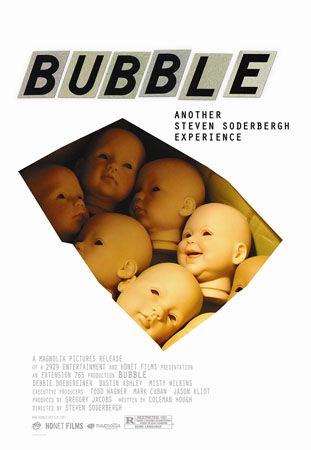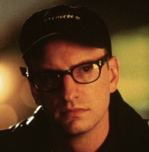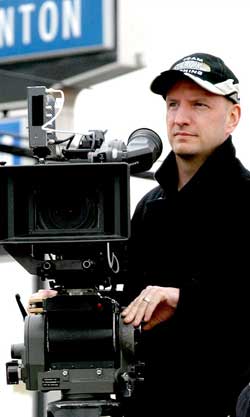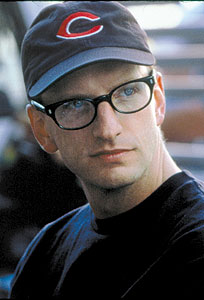 Steven Soderbergh is one of the most important directors working today. You just can’t argue that. His Sex, Lies and Videotape
Steven Soderbergh is one of the most important directors working today. You just can’t argue that. His Sex, Lies and Videotape
kick started the indie film revolution in the 80s, and since then he
and his peer Richard Linklater have gone on to define the ultimate
modern career path, balancing thoughtful, intelligent and personal
films with major blockbusters and broad Oscar fare.
Soderbergh isn’t done changing paradigms. His newest film, Bubble,
is a small movie shot in Ohio and West Virginia with a cast made up
entirely on non-actors. The story follows the friendship of doll
factory workers Martha (Debbie Doebereiner) and Kyle (Dustin Ashley)
when a third person is introduced – attractive young Rose (Misty Dawn
Wilkins). This triangle eventually comes to a head in murder.
Bubble
isn’t just experimental because of the cast – it’s also testing new
waters in film releasing. The movie hits 40 theaters tomorrow, and you
can watch it tomorrow night on HDNet (if you get that channel) at 9 and
11 PM EST. The DVD of Bubble comes out Tuesday – you can pre-order it now at http://www.bubblethefilm.com/.
Q:
When you came to this project, what was the first thing that came to
mind? To do a murder mystery? Or was it just a script that came to you?
Soderbergh:
No. Well, I knew that I wanted to get out of town, cause I think it’s
good to travel, and the initial idea was just a triangle. Coleman Hough
and I had been talking, and I’d sort of identified her as somebody that
wanted to help me on this first one. I watch a lot of true crime stuff
on TV, and a lot of those take place in towns that you don’t normally
see, which is fun. City Confidential – I love that show. Very sad that Paul Winfield is no longer with us.
So
that was all sort of mixing around, and then this idea of what they do
for a living grew out of my wondering… you go to the movies and it
seems like—lawyer, doctor, advertising—it feels like there’s four jobs
that you’re allowed to have in a studio move, and that seemed sort of
unfair, so I thought well, let’s look for an interesting job. I was
interested in manual labor, especially since I’ve had dead end jobs
before, but I’ve never had an all-day manual repetitive labor job. I
don’t know that I can do it. I don’t know how they do it, people that
literally just sit there and do the same thing for eight hours a day,
so I said I wanted something like that. Coleman’s the one who found the
doll factory. Apparently, there are three factories of any real size
left in the U.S. This is one of those businesses that’s gone overseas,
and two of them are in Bel Prix, Ohio.
Q: How did you cast Debbie as Martha? She had been working at KFC, right?
Soderbergh:
Our casting director, sort of embedded herself ahead of us, and went
around, asking people if they’d like to be interviewed. We didn’t do an
advertisement/cattle call thing. She knew kind of what we were looking
for and would approach people and ask if they would come and be
interviewed. She was in the drive-thru at the KFC. She’s normally a
very healthy eater, and just this one day she was jonesing for KFC,
which is much more my speed, and she’s sitting there and she hears this
woman berating these teenagers that worked there, like telling them
that they were not doing something right. [The casting director] leans
her head over, because at first she just hears the voice, and she sees
Debbie, and she immediately pulls out of the lane and parks and goes
into the restaurant and says, “Would you like to come down and be
interviewed to be in this movie?” For Debbie, you can imagine what an
odd occurrence this was, and then she comes down and she interviews,
and then of course, she hears that she’s got the part, and nobody at
KFC believes her, and they think this is all some Martha-like
psychosis. She has to go ask them for four weeks of leave so she can go
star in this movie.
The
guy who got the most flak was Decker Moody, who plays the detective,
whom I think is spectacular. He said that the people at work were
relentless, they just wouldn’t stop teasing him. They just thought that
this was a classic case of how smart can these Hollywood people be if
they’re putting you in this movie? He was incredible. I mean, I can
watch him for hours.  Q:
Q:
When you’re working with a cast like this who are not actors, how does
that make your job as director different? How do you work with them
differently as opposed to when you’re working with Brad Pitt or George
Clooney?
Soderbergh:
It’s interesting that some people have asked me… this came up in
Toronto, somebody asked if I was exploiting these people, and I said,
“Absolutely. Of course, I am. I’m also exploiting Brad Pitt.” I mean,
that’s the deal. I’m getting something and he’s getting something, and
I could argue that I’m getting more than him.
In this case
though, by the time we started shooting, we tried to explain in as much
detail as we could how this was going to work, and we’d also been
talking them to a lot, because all of these stories that they tell in
the movie are theirs. We were trying to fill up as much as we could
with these personal stories. I think they were a little anxious until
their first day of work, and then they realized… They just didn’t know
what was expected of them, and then once we showed up and they realized
that all I expect from you is for you to be yourself, as much as you
can. There’s no wrong answers. It’s not a test. Then they really
relaxed. I definitely saw a shift in Dustin from the beginning of the
movie to the end, just in terms of how he was relating to us and to the
crew. He changed. That story of him leaving high school because of this
anxiety disorder, that’s true. He’s not coming to the premiere tomorrow
night. There are too many people. He’s sending his girlfriend with a
camera to document it, but at the same time, it was really fun to see
him open up, because we sort of shot in chronological order. He was
having fun. You could see him joking and talking to the people at the
end of the shoot, which would have been unthinkable the first day.
Q:
How much have you been in touch with them since you’ve finished, and
how much do you plan to, since this is the kind of thing that would
change people’s lives.
Soderbergh:
Debbie and I e-mail every once in awhile. I’ll let her know this is
happening or like I e-mailed her after Venice and New York just to tell
her how the movie went over. They’ve been mostly in touch with Coleman,
they’ve been in touch with her a lot, and she sort of forwards me stuff
or she’ll tell me, because I talk to Coleman a lot and she’ll tell me
what’s going on. They seem to have a very healthy attitude about it. I
mean, everybody who worked on the film owns a piece of the film, so if
something good happens to the movie, this will be a great little
annuity for them.
I
know Debbie looked at it as just like camp. She was taking pictures all
the time. She said, “I can’t believe I’m going to walk into a video
store and my name is going to be on the box, and this is just so
exciting.” She had a great attitude about it.
Q: Do any of them have any aspiration to continue in acting?
Soderbergh: I
don’t know. I didn’t want to discourage them, but it’s hard if you’ve
seen what happens to people who go into acting, it’s hard to sit there
and go, “You should really pack up your car and move to Los Angeles.”
That’s not a responsibility that I would want, but I thought they all
did wonderfully well, and if somebody wants to give them an opportunity
to do something, why shouldn’t they take it?

Q:
Outside of your directing, were they provided with an acting coach or
did you approach directing them differently than you would another
actor?
Soderbergh:
Here’s one thing I’ve learned. The more that you can talk to an actor
in terms of just physicality, the better off you are. Whenever you get
onto “What you’re feeling here is… “, if you can be really specific
about something physical, it’s very helpful to them, because it takes
them out of their head. What you don’t want is an actor who’s in their
head, so more often than not, the physicality of the scene what was
really crucial.
Q: What direction did you give the young factory workers when they meet for the first time?
Soderbergh:
Well, I just told Misty to stare at him. He’s the only person that
you’re interested in this room. Stare at him, and then of course, we
shot that side of it, and she came over and said, “He won’t look at
me.” And I said, “Don’t worry, when I turn it around, I’ll make him
look at you.” The great thing about casting Dustin is then if I go to
Dustin and I go, “Dustin, I want you to stare at Misty and don’t look
at anything else,” as soon as we turned the camera on and he started
staring at her, his cheeks went just completely red, because it’s so
hard for Dustin Ashley to stare at a girl without looking away for
sixty seconds. It’s like physically hard for him to do that, because
he’s so shy, and he just flushed, and you just can’t put a price on
that. That’s just luck.
Q: So you’ve signed on to do five more movies as part of this deal. Have you thought about what you want to do next?
Soderbergh: Non-actors,
different locations, stories set hopefully all around the country, so
it will be a quilt of movies that are sort of Americana in one way or
another. But yeah, same idea. I know what the next two are going to be,
and I’m at the stage where I know them well enough to where once I
decide where to do them, I can go to the town. I know what the number
of characters are in the movie, so we can start the process of
embedding ourselves and building the story. It’s just a matter of when
I’m going to have another window of opportunity.
Q: Do you build these films more organically?
Soderbergh:
I hope that the development process on everything we work on is
somewhat organic, or at least not forced, but in this case, the
flexibility of the way that the movies are being financed and produced
allows you a lot more freedom than you would normally. I mean, it’s
difficult on movies of over a very small scale to get somebody to
basically just let you go and figure it out. It takes a company like
this. All we had was a three-page scene breakdown with a description of
who’s in the scene and what happens, and that was it, and there are a
lot of people who don’t want to finance movies on that basis, and I
understand it, but [producers] Todd and Mark know me well enough to
know that I’m a big believer in parameters. On the one hand, I have a
lot of freedom. On the other hand, there are certain economic
boundaries that I have to sort of accept. I feel like there have to be
lines.
Q: Your career
has been so interesting because you bounce around from small,
experimental films to big blockbuster films. In the last few years
you’ve really refined that balance. Forgive me if this question is
indelicate and or rude, but you’re going back to the Ocean’s 11 well again for Ocean’s 13
– is that a case where you really felt like you had a story to tell
there, or was it just, ‘I want to go on making interesting movies, so I
had better make some money’?
Soderbergh:
No, I love making those. Both the second one and this one were
generated by me saying I wanted to do another one. Nobody asked –
certainly nobody’s asking for this one. I just wanted to. I had another
idea and I went to everybody and said, ‘I have another idea,’ and
everybody said fine.
They’re
fun for me. I just get to play as a director. I get to do things in
those movies I can’t do anywhere else, so they’re fun for me. They’re
not easy, in the sense that I work hard on
them. You really do have to show up everyday with ideas to keep things
moving along. And sometimes that’s hard, because there are days when
you don’t have any ideas. But it’s also difficult to find material that
is commercial that doesn’t make you feel bad in the morning. These are
great opportunities for me.
Q:
Is finding commercial material conscious? Do you say, ‘It’s been a
couple of years, I should find something commercial again?’
Soderbergh:
It’s just balance. I want to move in any direction that I want. And
part of that is once in a while you have to make a movie that
somebody’s heard of.
Q: You were able to get everyone back for the last one. Will they all be back again this time?
Soderbergh: Yeah,
I checked with them before we even got started to make sure. I said I
had an idea but I wasn’t doing it unless everybody was on board.
Q: You also have a project about Che Guevera.
Soderbergh:
We’re actually shooting six days in New York this month, which we’re
then going to hold, and the rest of the film will be shot next year.
It’s
hard to describe because we’re still working on the script. I have been
on and off – I was on initially and then I left and then Terry Malick
came on, and then I came back on. But it’s something that Laura
Bickford, who produced Traffic, and Benecio and I have been talking about since Traffic,
and we’re just now starting to get close to having the script the way I
want. He’s a very complicated subject. He’s one of the few figures that
holds up the more you scrutinize him, but he was really complicated.
There’s a lot of story there, and we’re trying to figure out what story
we’re going to tell.
Q: How will you make it different from Motorcycle Diaries?
Soderbergh: Our movie is about Cuba and Bolivia. This is a war movie.
Q: Are there any aspects of what Malick brought that might carry through in your version?
Soderbergh:
When Terry was working on the movie it was only about Bolivia, so there
might be some stuff from there that might survive. But the sequence
that we’re shooting now is when he came to New York in December of ’64
and spoke at the UN. I guess the UN is going to be refurbishing and we
have to get in there before we do.
Q:
Can you talk about getting Robert Pollard of Guided by Voice to do the
music, and why you decided to go with just an acoustic guitar for the
soundtrack?
Soderbergh:
It was a last minute desperation move basically. The good news about
Robert Pollard is he’s very quick. I’ve always been a huge fan of
Guided by Voices, so I had mentioned Guided by Voices in an interview
years and years ago, and his management had put me on his mailing list.
I started getting discs and things. Then I went to see one of their
shows in New York last year–I hadn’t seen them live ever—and met a guy
named James Greer there who had just wrote this book on Guided by
Voices that was released in November. He asked me to do an introduction
to the book, and I did, and I met Robert Pollard. He lives in Ohio, and
it just seemed like the right thing to do.
Q: Could you explain why you chose to call this Bubble?
Soderbergh:
No, it just kind of popped into my head. On the most superficial level,
that’s how I would describe Martha and Kyle’s relationship, something
really beautiful and really delicate, and then Rose showed up and
popped it. Literally, during one of the nights when I was just working
on the thing. I have a notebook for whatever project I’m working on,
and I had just written that as a possible title.
Q:
What about the decision of releasing it on DVD and in theatres at the
same time – is there a reason why someone should see this in a theatre
rather than just waiting a couple days for the DVD? Is it a different
experience?
Soderbergh: Oh,
sure. I just don’t know if you can judge whether one is better or
worse. You can take the view that this is all an example of how people
are disconnecting and they’re staying home, and they’re not having
communal experiences. Maybe that’s true, but as long as it’s legal, I
don’t know how you’re going to stop it, and I really don’t have a
desire and I don’t think we should be trying to control how people
experience art. They can see it on a screen or on a T-shirt. I think if
you’ve got something that’s interesting, it doesn’t really matter how
they’re seeing it. I’m not precious that way, let’s put it that way.
Q:
You’re the kind of director who is always working and we’re always
hearing about projects you’re doing. Why do you work so hard and why do
you have so many projects going? Soderbergh:
Soderbergh:
Yeah, it’s a problem, but why wouldn’t you? It’s the best job in the
world. Why wouldn’t you be busy. I can’t image if you were in a
position to have a lot of people say “yes” why you wouldn’t get a lot
of people to say “yes”. I’m 42, and I feel like I still haven’t made my
best work. I’m young enough to have the energy to be busy, and I’m
experienced enough to be in a position if I pushed to make something
that I think is really, really good. I feel like your ‘40s, you gotta
get on it. I can see a time where I’ll just stop.
Q: And what about your production company, Section 8? It’s done after this year?
Soderbergh: Yeah.
Q: Why?
Soderbergh:
The work load was too heavy for me. I think we both felt [he and
partner George Clooney] that it would be finite. We wanted to go out
with Abbey Road and have it be something that never went bad. A little
while back we decided – it was funny, when we made this decision to
have the company end at the end of the next term, people were not
liking what we were doing. It’s funny that now we’re on an upswing and
I hope that will continue to the end of the company. But it had kind of
run its course. We learned a lot, and we worked with a lot of terrific
people, but I’m not a producer by trade, and it was having an effect on
my ability to do my day job, and that was becoming a concern. And I
think it was becoming a concern for George, too. As we can see he’s a
director, and I think he’s interested now in pursuing that more than
what the company started.
Q: Where do the ideas keep coming from?
Soderbergh:
I asked Robert Pollard, who’s written thousands and thousands of songs,
a remarkable number of them good, ‘Bob, where do the songs come from?’
He said, ‘The suitcase. I reach into the suitcase.’
Q:
Your own career has been so well documented while you’re still working.
How do you feel about having your career encapsulated already in a
number of books, and having so many filmmakers cite you as an influence?
Soderbergh: You
can never associate yourself with having the kind of influence the
filmmakers you admire had one you. You just can’t. If you could, that
would be a sign of a serious personality defect. I don’t have sense of
that at all. It’s just that the lens is not going in that direction. My
job is to make stuff.
Q: But when someone writes about you, do you read it? Did you read Waxman’s Rebels on the Backlot?
Soderbergh: I read some of it.
Q: How did you feel about it?
Soderbergh: There were a lot of errors, so I just stopped.
Q: Did you try to contact her and correct it?
Soderbergh: No. I’d rather have an idea.
Q:
You’re premiering this film in Parkersburg, Ohio, where you shot it. Is
this the kind of film that the people of Parkersburg would be
interested in if they weren’t in it?
Soderbergh:
I don’t know. I think tomorrow night’s going to be really interesting
because I don’t know what they’re expecting, but I don’t know if it’s
this. We were just talking about this, the question of are people like
this underrepresented in movies because nobody wants to see them or
because there haven’t been enough made to generate interest for people
to see them. Is it a chicken and the egg question, or if more movies
like this got made would people whose lives were like that say, ‘Oh, I
really enjoyed that.’ Or do they go to the movies and say, ‘I don’t
want to see that – I get that at home.’ I don’t know, I guess we’ll
find out.